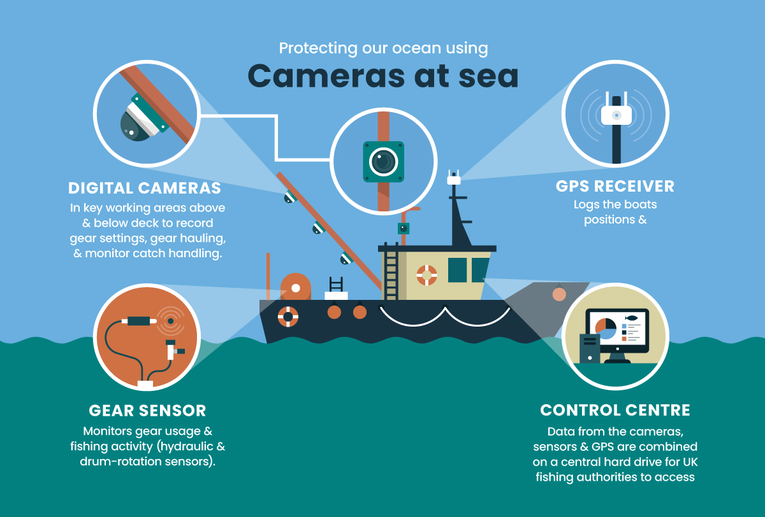
TransparentSea
As part of the Future Fisheries Alliance, we've come together with RSPB and WWF to create a colourful, cutting-edge report that outlines why effective monitoring on vessels using Remote Electronic Monitoring (REM) with cameras is essential if we are to eliminate bycatch, as well as overfishing.
Overview
Fish are central to the health of our ocean and the livelihoods of fishing communities.
These problems are often hidden in the depths of the ocean as a result of poor fishing activities and fish being illegally discarded at sea.
Bycatch issues
Incidental death in fishing gear is one of the top threats to marine wildlife across the globe.
In UK waters, thousands of rare and threatened marine animals continue to be killed unnecessarily as ‘bycatch’ in fishing gear every year, caught on fishing hooks, entangled in nets, or wrapped up in ropes.
We don’t currently know the true levels of bycatch. And we don’t know how much fish is coming out of the sea. But we do know that if fishing activity at sea is more effectively monitored, it will help fishers evidence a more sustainable approach to fishing.
Cameras at sea

Remote Electronic Monitoring (REM) systems are a game changing technology that combine video and sensor technology to provide a full picture of fishing activity.
REM allows us to see where, what, and how fish and other marine wildlife are being removed from our ocean.
These smart cameras at sea enable fisheries to expand data collection of their fishing fleets to assess bycatch levels and mitigation methods, fish and catch levels, conservation science data and to discourage discards overboard.
Confident consumers, responsible retailer
Conclusion
Intelligent cameras at sea are a win-win-win for wildlife, fishers, and the consumer.
REM provides an effective, value-for-money tool to assess fishing activities, collect data and assure sustainable best practice. This will help to protect marine ecosystems and prevent unsustainable fishing, whilst increasing long term yields and profits for fishing communities.
It should be a mandatory requirement to have REM with onboard camera coverage on all vessels fishing in UK waters to support sustainable fishing and safeguard our ocean.
Sources
- CEFAS Assessing the sustainability of catch limits negotiated 2022
- Scottish Government estimates 7,000 tonnes of undersized haddock discarded in 2021 (thefishingdaily.com)
- An evaluation of cetacean bycatch in UK fisheries: problems and solutions (2021)
- defra - Research and Development for the UK Seabird Plan of Action (PoA) - ME6024
- Assessing bycatch risk from gillnet fisheries for three species of diving seabird in the UK (2022)
- Scottish public opinion poll on MPAs (2022)
- The SSC calls for clarity and ambition for the future of UK fisheries management (2022)
- van Helmond et al (2019) Electronic monitoring in fisheries’ in Fish and Fisheries
- Minister Pow keynote speech - Coastal Futures 2022 - GOV.UK (www.gov.uk)
- Ulrich et al. 2015 Discarding of cod in the Danish Fully Documented Fisheries trials
- Remote Electronic Monitoring - Protecting Our Ocean Through Enhanced Fisheries Monitoring (2020)
- WWF: Remote Electronic Monitoring in UK Fisheries Management (2017)













